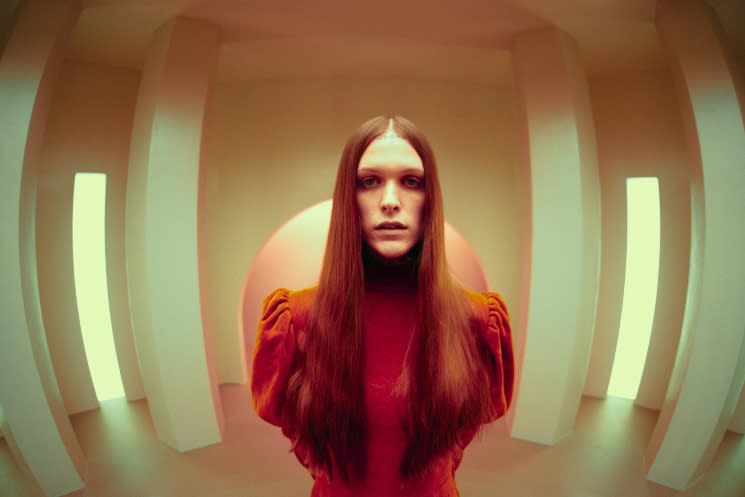When Ethel Cain became one of last year's biggest breakout acts (even landing on Barack Obama's 2022 year-end list), her social media literacy was called upon to help her maintain momentum and continue to grow her fanbase. But it quickly proved to be to her detriment, leading the singer-songwriter to feel "like a dancing monkey in a circus."
Like many in the Elon Musk overlord era, Cain recently deleted her Twitter account after honing a reputably sharp, self-deprecating presence on the website. On a daily basis, she once partook in memes and jokes about her own public image — and it took a toll on her.
In a new interview with The Guardian, the artist opened up about her role as a performing animal in internet culture. "It's very like, 'Oh, she's so funny on Twitter, she's so relatable,' and then it becomes this big weird joke cycle," she told Shaad D'Souza.
"Don't get me wrong, laughter and memes and jokes are always really fun," Cain continued. "But when you want to post something to be consumed seriously, people are still joking — and then you get like, thousands of comments that are like, 'silly goose.' All of a sudden, you start to feel like you can't turn off the memeable internet personality thing."
And those jokes can seep into real life, including live shows. "I had a show recently where I was singing the really quiet intro to 'Sun Bleached Flies,'" she recalled of performing one of the tracks from her beloved debut LP, Preacher's Daughter. "I went to hold [a fan's] hand and they began sort of screaming, 'I didn't even know who you were two weeks ago, I found you through a meme on TikTok.' It's almost like heckling. I don't think any of them are mean-spirited, but it's a little jarring."
The singer-songwriter admitted to D'Souza that she "would really love to have a much smaller fanbase, and kind of go back to where I was aiming for ahead of time," as her legions of fans — she has an Instagram following of over 302,000 — soon began to demand unfettered access to her, as well as her family and friends.
"I really do want to reiterate how grateful I am for everyone who's ever said a nice word about my music," Cain added. "But I really think there can be too much of a good thing — there's just some levels of success that I really don't want for myself."
Like many in the Elon Musk overlord era, Cain recently deleted her Twitter account after honing a reputably sharp, self-deprecating presence on the website. On a daily basis, she once partook in memes and jokes about her own public image — and it took a toll on her.
In a new interview with The Guardian, the artist opened up about her role as a performing animal in internet culture. "It's very like, 'Oh, she's so funny on Twitter, she's so relatable,' and then it becomes this big weird joke cycle," she told Shaad D'Souza.
"Don't get me wrong, laughter and memes and jokes are always really fun," Cain continued. "But when you want to post something to be consumed seriously, people are still joking — and then you get like, thousands of comments that are like, 'silly goose.' All of a sudden, you start to feel like you can't turn off the memeable internet personality thing."
And those jokes can seep into real life, including live shows. "I had a show recently where I was singing the really quiet intro to 'Sun Bleached Flies,'" she recalled of performing one of the tracks from her beloved debut LP, Preacher's Daughter. "I went to hold [a fan's] hand and they began sort of screaming, 'I didn't even know who you were two weeks ago, I found you through a meme on TikTok.' It's almost like heckling. I don't think any of them are mean-spirited, but it's a little jarring."
The singer-songwriter admitted to D'Souza that she "would really love to have a much smaller fanbase, and kind of go back to where I was aiming for ahead of time," as her legions of fans — she has an Instagram following of over 302,000 — soon began to demand unfettered access to her, as well as her family and friends.
"I really do want to reiterate how grateful I am for everyone who's ever said a nice word about my music," Cain added. "But I really think there can be too much of a good thing — there's just some levels of success that I really don't want for myself."
